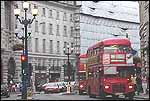I've been having a bit of a two way barney
elsewhere, attacked from one side for saying horrid things about the role of the USSR in formation of North Korea and from the other for claiming that South Korean democracy is not a result of the US intervention on the peninsula, but quite the opposite.
I won't deal with the former issue right now (maybe soon...), but I want to make a few brief points about the latter and direct readers toward some more in-depth reading.
To summarise, South Korea is cited as an example of a country where US military intervention in the Korean War prevented the whole country from becoming a dictatorship under Kim Il-song (for a recent example of this sort of throw away reference see
this recent comment on a post at
Lenin's Tomb). Of course, what's been left out here is the fact that the Korean War was followed in South Korea by a string of dictatorships backed financially, militarily and politically by successive US administrations (and people wonder why the scourge of 'anti-Americanism' is so rife in South Korea these days).
Right-leaning Korea commentator the
Marmot provides quite a neat list in
this post of the ugly regimes and incidents that the US either tacitly supported or outright encouraged. First there was Syngman Rhee's government and its violent suppression of various uprisings, then when he was finally overthrown by a student revolution in 1960 it wasn't long before the US gave its approval to Park Chung-hee's military coup and proceeded to give him large amounts of financial aid. The list can of course go on, but probably the most infamous incident in the whole history of the US relationship with South Korea's autocratic rulers was the Kwangju Massacre of 1980. This has been covered in one or two excellent English-language books, particularly the rather enigmatically titled
Kwangju Diary: Beyond Death, Beyond the Darkness of the Age.
At particular issue when it comes to Kwangju is the question of US culpability. The facts that the US government knew about Chun Du-hwan's plans to suppress the pro-democracy uprising using his Black Beret special forces and that they did nothing about this are indisputable. In fact, it is clear that the US government thought this the best option and were much more worried about what would happen if the uprising was not ruthlessly suppressed. Deputy Secretary of State Warren Christopher said at the time
"We agree that we should not oppose ROK contingency plans to maintain law and order." And less than a year after the massacre that had left still-unknown hundreds (or thousands) dead, Chun was invited to the White House (after making the necessary 'democratic' gesture of commuting moderate pro-democracy leader Kim Dae-jung's death sentence to life in prison) where Reagan declared to him "You've done much to strengthen the tradition of 5,000 years' committment to freedom." (New York Times, Feb 2, 1981). For more detail on Kwangju and the documents implicating the US government in the incident see Chalmers Johnson's summary and Tim Shorrock's in-depth piece on the Cherokee Files. (I've just discovered that Tim Shorrock has a blog with recent piece on Kwangju which is well worth checking).
Much has already been written about Kwangju so I won't go on here. The point I want to make is that the people of South Korea were able to achieve the freedoms and democratic representation that they have now (albeit both are somewhat limited) as a result of their own efforts and particularly through the brave struggles they fought in the 1980s.
My hope is that the Koreans living in the northern half of the peninsula can follow the example of their brothers and sisters in the south and achieve the same things. There are some signs of new dissent (see these posts
1 /
2 /
3) in North Korea, but what direction this goes in depends to a great extent on how the US intervenes. Unfortunately, I feel that it is likely to use the tens of millions of dollars released by the
North Korean Human Rights Act to fund those groups or individuals who it believes are most likely to create the kind of pro-US regime it wants to see, or to cooperate with the most rightwing elements in the South to the detriment of the left - a sort of 'killing two birds with one stone' strategy. The future of North Korea also depends, of course, on the ambitions of the lower-league wannabe imperialist powers - China and Japan, and how the US interacts with these two powers in this geopolitically crucial part of the world. I think that just as in the South, US intervention is highly unlikely to bring freedom and democracy, because US interests will not be compatible - the North Koreans are going to have to do it for themselves.






.jpg)





